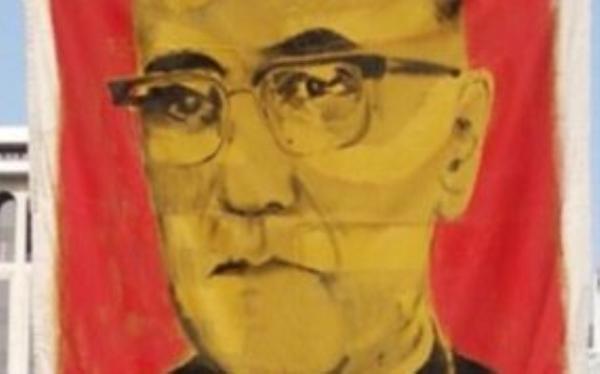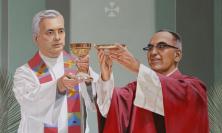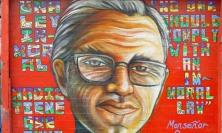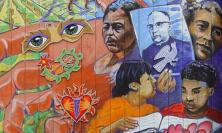Using many of Archbishop Romero’s own words, Michael Campbell-Johnston SJ gives an account of the public life of the modern martyr whose anniversary is celebrated tomorrow. How did the formerly conservative priest ‘rediscover his roots’ and become a champion of the cause of the oppressed?
On 24 March 2011, people all over the world will be celebrating the 31st anniversary of the assassination of Archbishop Oscar Romero of San Salvador. He was shot, by orders of the government, while celebrating Mass in the chapel of the hospital for incurables where, as Archbishop, he lived. The previous day he had preached what was to be his last Sunday sermon in the cathedral. In it he made an appeal to the ordinary soldiers in the army and low-ranking policeman, calling on them not to obey immoral orders from their officers. His words were moving:
Brothers, you come from our own people. You are killing your own brother peasants when any human order to kill must be subordinate to the law of God which says ‘Thou shalt not kill’. No soldier is obliged to obey an order contrary to the law of God. No one has to obey an immoral law. It is high time you recovered your consciences and obeyed your consciences rather than a sinful order. The church, the defender of the rights of God, of human dignity, of the person, cannot remain silent before such an abomination. We want the government to face the fact that reforms are valueless if they are to be carried out at the cost of so much blood. In the name of God, in the name of this suffering people whose cries rise to heaven more loudly each day, I implore you, I beg you, I order you in the name of God: stop the repression.
The following day, a sniper was sent to shoot him while he was offering Mass. Little did the authorities realise that, instead of silencing his voice, this would spread it to the four corners of the earth, and that his message would give hope and inspiration to thousands.
When Romero’s predecessor, Archbishop Chávez y González retired after 38 years, neither he nor the majority of his priests wanted Romero to succeed him. Timid, retiring, hesitant, conservative in thought and action, he seemed the last person they needed at that particular moment of El Salvador’s history. They wanted Bishop Rivera y Damas, auxiliary of San Salvador, a firm supporter of the post-Medellín Church who was not frightened to speak out. But Romero was the candidate nominated by the Nuncio, who had consulted the government, the military, business circles and society ladies who felt he would be ‘one of ours whom we could control’. They even offered him a luxurious mansion and a large new car, both of which he refused.
The story of Romero’s conversion, though he himself preferred to speak of rediscovering his roots, is well known but bears repetition. While its importance should not be exaggerated, an event which occurred only three weeks after Romero had taken over as Archbishop had a profound and lasting effect on him. Rutilio Grande, a young Salvadoran Jesuit priest, was assassinated, together with an old man and a 15-year-old boy as they were on their way to celebrate Mass in the small village church of El Paisnal some 30 miles north of the capital. Romero and Rutilio had come to know each other ten years previously when both were living in the diocesan seminary, Romero as secretary to the Bishops’ Conference and Rutilio as teacher and prefect of the students. As soon as he heard of the assassination, Romero left the city and went to the church in Aguilares where the three bodies were laid out. There he celebrated Mass with the Jesuit Provincial and then, with peasants who had come in from many surrounding villages, spent part of the night in prayer and part seeking advice on what should be done.
As Romero recounted afterwards, that night he read the Gospel message anew through the eyes of the poor and oppressed. He began to understand what Jesus has to say, and therefore what he as Archbishop should also be saying to the despised, the persecuted and the underprivileged. As he put it later to César Jerez, the Jesuit Provincial: ‘When I looked at Rutilio lying there dead, I thought: if they killed him for doing what he did, then I too have to walk the same path.’[1] When morning came, he returned to the capital, summoned his priests and advisers and decided after long and sometimes difficult discussions, to boycott all state occasions and meetings with the president until an official investigation into Rutilio’s death was carried out. It never was, and throughout his time as Archbishop, Romero did not attend a single state occasion, not even the swearing-in of the new president. He also decided to close all Catholic schools for three days, inviting both pupils and teachers to reflect on what had happened. Finally, in the face of strong ecclesiastical opposition from the Papal Nuncio, he decided to suspend all Masses in the capital the following Sunday and celebrate just one Mass in the Cathedral with all his priests, both as a sign of protest to the Government and of solidarity with Rutilio and the cause for which he died. Over 150 priests concelebrated the Mass which was attended by an estimated 100,000 people, one of the biggest crowds ever seen in the country. And in the streets around the Cathedral, long lines queued up to go to confession. For many, and not just Romero, it marked a turning point.
The rest, as the saying goes, is history. Over the next three years, Romero, visibly growing in strength and conviction, became the defender of the oppressed, ‘the voice of those who had no voice’, the conscience of a nation. His Sunday sermons in the cathedral – which, towards the end of his life lasted 1½ hours – were, when the diocesan radio station was functioning and hadn’t been sabotaged, listened to by friend and foe alike throughout the country, and by many abroad. To his enemies he was an agitator, a communist, a false priest, an ambitious schemer out for himself. Some such attacks – and this hurt him most – came from his fellow bishops who accused him of being politicised and preaching erroneous theology. But Rome also lent an ear to these accusations. No less than three apostolic visitors were sent to examine him in a little over a year while the Congregation of Bishops, under Cardinal Baggio, considered imposing on him an apostolic administrator with full powers to run the diocese. It is common knowledge that, whereas he felt confirmed in his ministry after meeting Pope Paul VI, his first encounter with Pope John Paul II left him sad and disheartened. And, as we have seen, to the government and the military, Romero was a permanent threat, a thorn in the side, a subversive voice that had to be silenced.
A month before his assassination, Archbishop Romero received a warning from the Papal Nuncio in Costa Rica that there were new death threats against him and that he should be very careful. This warning was repeated shortly afterwards by the Nuncio in El Salvador just as Romero was beginning his annual retreat with a group of diocesan priests. It is not surprising therefore that, during this retreat, Romero tried to come to terms with the prospect of his assassination. He was clearly frightened. He wrote in his retreat notes: ‘I feel afraid of violence against my person. I fear for the weakness of my flesh but I beg the Lord to give me serenity and perseverance.’[2] And a little further on: ‘My disposition should be to offer my life to God, whatever way it may end. He helped the martyrs and, if need be, I will feel Him very near as I offer him my last breath.’ And then comes his full acceptance: ‘I accept with faith in Him my death, however hard it be.’ He ends with a firm act of faith: ‘For me to be happy and confident, it is sufficient to know with assurance that in Him is my life and my death, that in spite of my sins I have placed my trust in Him and shall not be disappointed, and others will carry on with greater wisdom and holiness the works of the Church and the nation.’
It was certainly the grace of this retreat and the strength Romero found through his prayer that enabled him to reply two weeks later to a Mexican journalist, who asked him if he was afraid of death:
I have often been threatened with death. I have to say, as a Christian, that I don't believe in death without resurrection: if they kill me, I will rise again in the Salvadoran people. I tell you this without any boasting, with the greatest humility. As pastor, I am obliged, by divine command, to give my life for those I love, who are all Salvadorans, even for those who are going to assassinate me. If the threats are carried out, even now I offer my blood to God for the redemption and resurrection of El Salvador. Martyrdom is a grace of God I don’t think I deserve. But if God accepts the sacrifice of my life, may my blood be the seed of liberty and the sign that hope will soon become reality. May my death, if accepted by God, be for the freedom of my people and as a witness to hope in the future. You can say, if they come to kill me, that I forgive and bless those who do it. Hopefully they may realise that they will be wasting their time. A bishop will die, but the Church of God, which is the people, will never perish.[3]
These great words express the real nature of martyrdom: and not just the martyrdom of Romero but of hundreds and thousands of ordinary people who, throughout the ages, have offered their lives in defence of what they believe. For that is the essence of martyrdom: to give witness to the truth through the offering of one’s life.
This man, who offered his life, is venerated across the world by Christians and non-Christians. His statue, along with those of nine other twentieth century martyrs, sits atop the west entrance to Westminster Abbey. There are many reasons for such devotion to Archbishop Romero, but I would like to emphasise three.
First of all, he was a simple and humble man who not only remained in touch with the poor, but went out of his way to listen to and learn from them. As his Vicar-General, Mons Urioste explained, at the age of 60 he went back to school. But his teachers were not university professors or professional theologians. They were the simple uneducated peasants who flocked to his office from all over the country to explain their situation to him and seek his understanding and support. He was always ready to receive them and gave them priority over the many VIPs who also sought to see him. In this he resembled Jesus himself. A new life published for his 30th anniversary[4] makes this point very clearly and describes the remarkable similarity between his life and that of Jesus of Nazareth.
Both were born into conditions of poverty in the province of a small and insignificant country. Both lived a life of profound intimacy with God and prayed by night. Both learned the trade of a carpenter. For both, the assassination of a good friend became a decisive event in their lives. They became public figures through their preaching, proclaiming the goodness of God and announcing the coming of the kingdom of God as a new order of love among all people. Both took sides with the poor and those who were socially excluded. Following the tradition of the prophets of Israel, they denounced injustice and corruption. In time, all the important social groups were allied against them. They were accused of being traitors who tried to upset the established order. Both confronted the imperialist powers of their day, and their public life lasted a mere three years.
Secondly, as several incidents in his life show, he sought advice from many people and, being a man of deep prayer, spent hours on his knees in the presence of God before deciding on a particular course of action or what to say in his weekly homilies, listened to by thousands all over the country. Romero was always ready to admit his mistakes and ask forgiveness for them. But once his mind was made up, he was fearless in speaking out, denouncing corruption and evil with no regard for his own personal safety. As he put it, ‘if I denounce and condemn injustice, it is because this is my duty as pastor of an oppressed and downtrodden people. The Gospel enjoins me to do this and, in its name, I am ready to go before the courts, to prison and to death.’[5]This was one of the reasons why he himself claimed that his word would not die but would live on in the hearts of those who have wished to receive it. For it was not his word but the word of Christ speaking through him. Describing one of his early sermons, a witness reports: ‘At the beginning of Mass, I noticed Monseñor Romero nervous, pale, perspiring. And when the homily started, he seemed slow, without his usual eloquence, as if doubting to enter the door history and God were opening for him. But after five minutes, I felt that the Spirit of God had descended on him.’[6]
Finally, his message is still valid today and needed as much as it was 30 years ago. The core of it, as he repeated many times, was the call of the Latin American bishops at their 1968 conference in Medellín, repeated in his presence at Puebla in 1979, for ‘the conversion of the whole church to a preferential option for the poor with a view to their integral liberation.’[7]In a country torn apart by violence and bloodshed, he saw quite clearly where the root of the problem lay:
I will not tire of declaring that if we really want an effective end to the violence, we must remove the violence that lies at the root of all violence: structural violence, social injustice, the exclusion of citizens from the management of the country, repression. All this is what constitutes the primal cause, from which the rest flows naturally.[8]
From this it follows that it is the duty of the Church and all its members ‘to know the mechanisms that generate poverty, to struggle for a more just world, to support the workers and peasants in their claims and in their right to organise, and to be close to the people.’[9]
The present situation in El Salvador has hardly changed in this respect and, though open hostilities have ceased and a new government more open to justice issues been put in place, the suffering of the poor and discrimination against them continue. And on the whole they are the same people and their situation has not improved. Globally, wealthy countries continue to impose harsh structural adjustment programmes on debt-ridden and defenceless nations, who have no option but to accept and endeavour to implement them, knowing full well that most of their own citizens will be the first to suffer.
So what Romero has to teach us about being a genuine follower of Christ is still relevant to all of us. He doesn’t mince his words: ‘It is inconceivable to call oneself a Christian without making, like Christ, a preferential option for the poor.’[10]; ‘A Christian who defends unjust situations is no longer a Christian’[11]; ‘The wealthy person who kneels before his money, even though he goes to Mass, is an idolater and not a Christian.’[12] And finally a warning: ‘It is a caricature of love to cover over with alms what is lacking in justice, to patch over with an appearance of benevolence when social justice is missing.’[13]
Because of Romero’s forthright stand, the example he gave and the sort of person he was, the poor in El Salvador and many other countries still look to him as their saviour, their father. I would like to end this brief account with the testimony of a witness who went into the cathedral early one morning to pray at his tomb.
One winter’s morning, the sky dark with rain, a man in rags, covered in dust, his shirt in shreds, was carefully cleaning Romero’s tomb, using one of his rags. It was barely light but he was already active and awake. And though the rag was filthy with grease and age, he was giving a polish to the stone. On finishing, he smiled contentedly. At that early hour he had seen no one. And no one had seen him except me. When he went out onto the street, I felt I had to speak with him. ‘You, why are you doing that?’ ‘Doing what?’ he replied. ‘Cleaning Monseñor’s tomb.’ ‘Because he was my father.’ ‘How was that?’ ‘I’m no more than a poor beggar. Sometimes I’m a carrier in the market with a cart, other times I beg, and sometimes I spend everything on liquor and lie senseless in the gutter. But I never lose hope. I had a father. He made me feel somebody. Because people like me, he loved and didn’t turn up his nose. He spoke to us, touched us, asked us questions. He trusted us. He let it be seen the love he had for me. Like the love of a father. That’s why I clean his tomb. As a son would.’ [14]
Fr Michael Campbell-Johnston SJ is former Provincial of the British Jesuits. He is now a member of the Jesuit community at Farm Street, Central London. He is the author of the recent, Just Faith: A Jesuit Striving for Social Justice (Way Books, 2010).
[1] Piezas para un Retrato, María López Vigil, UCA Editores, 3a Ed., 1995, p. 149
[2] El ultimo retiro spiritual de Monseñor Romero, Revista Latinoamericana de Teología, V, No. 13, enero-abril 1988, pp. 4-7.
[3] La voz de los sin voz: La palabra viva de Monseñor Romero, UCA Editores, 2a Ed., 1986, p. 62 and p. 461.
[4] Scott Wright, Oscar Romero and the Communion of the Saints (Orbis Books, 2009)
[5] Homilias, 14 May 1978: Vol. IV, p.47
[6] Piezas, op. Cit., pp. 108-109
[7] Puebla: La evangelización en el presente y en el futuro de América Latina, UCA Editores, 3a Ed., 1985, p. 223: §1134.
[8] Homilias, 23 September 1979: Vol. VII, p.294
[9] Ibid., 6 August 1979: Vol VII, p.153
[10] Ibid., 9 September 1979: Vol VII, p.236
[11] Ibid., 16 September 1979: Vol VII, p.262
[12] Ibid., 11 November 1979: Vol VII, p.426
[13] Ibid., 12 April 1979: Vol VI, p.276
[14] Piezas, op. cit., p. 398
![]() ‘The Martyrs of our Modern Church’ by Michael Campbell-Johnston SJ
‘The Martyrs of our Modern Church’ by Michael Campbell-Johnston SJ![]() Just Faith: A Jesuit Striving for Social Justice by Michael Campbell-Johnston SJ
Just Faith: A Jesuit Striving for Social Justice by Michael Campbell-Johnston SJ






